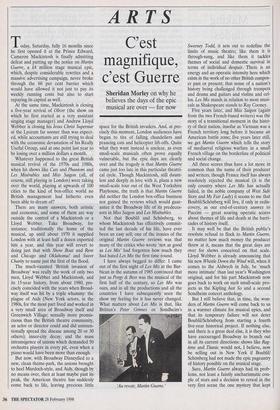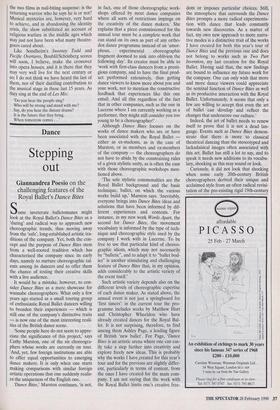ARTS
C'est magnifique, c'est Guerre
Sheridan Morley on why he believes the days of the epic musical are over — for now Today, Saturday, fully 16 months since he first opened it at the Prince Edward, Cameron Mackintosh is finally admitting defeat and putting up the notice on Martin Guerre, a £4 million stage musical epic, which, despite considerable rewrites and a massive advertising campaign, never broke through the 60 per cent barrier which would have allowed it not just to pay its weekly running costs but also to start repaying its capital as well.
At the same time, Mackintosh is closing a five-year revival of Oliver (the show on which he first started as a very assistant singing stage manager) and Andrew Lloyd Webber is closing his Jesus Christ Superstar at the Lyceum far sooner than was expect- ed, while accountants are still trying to deal with the economic devastation of his Really Useful Group, said at one point last year to be losing over a million dollars a month.
Whatever happened to the great British musical revival of the 1970s and 1980s, when hit shows like Cats and Phantom and Les Miserables and Miss Saigon (all, of course, still playing in London) were taking over the world, playing at upwards of 100 cities to the kind of box-office world no British management had hitherto even been able to dream of?
There are many answers, both artistic and economic, and some of them are way outside the control of a Mackintosh or a Lloyd Webber. Take Broadway, for instance; traditionally the home of the musical, up until about 1970 it supplied London with at least half a dozen exported hits a year, and this year will revert to doing just that with Show Boat and Rent and Chicago and Oklahoma! and Sweet Charity to name just the first of the flood.
The much-vaunted 'British invasion of Broadway' was really the work of only two men, Lloyd Webber and Mackintosh, and its 15-year history, from about 1980, pre- cisely coincided with the years when Broad- way itself was hit by a triple whammy: the plague of Aids (New York actors, in the 1980s, for the most part lived and worked in a very small area of Broadway itself and Greenwich Village; sexually more promis- cuous than the British theatre community, an actor or director could and did uninten- tionally spread the disease among 20 or 30 others); inner-city decay; and the mass intransigence of unions which demanded 50 orchestra players in every pit, even when a piano would have been more than enough.
But now, with Broadway Disneyfied to a new, clean theme-park, the unions brought to heel Murdoch-style, and Aids, though by no means over, then at least maybe past its peak, the American theatre has suddenly come back to life, leaving precious little space for the British invaders. And, at pre- cisely this moment, London audiences have begun to tire of falling chandeliers and prancing cats and helicopter lift-offs. Quite what they want instead is unclear, as even small-scale musicals often prove equally vulnerable, but the epic days are clearly over and the tragedy is that Martin Guerre came just too late in this particular theatri- cal cycle. Though Mackintosh, still daunt- less and deeply in love with it, plans a new small-scale tour out of the West Yorkshire Playhouse, the truth is that Martin Guerre did neither the London box-office business nor gained the reviews which would guar- antee it the Broadway life of its predeces- sors in Miss Saigon and Les Miserables.
Not that Boublil and Schonberg, to whom Mackintosh has effectively commit- ted the last decade of his life, have ever been an easy sell; one of the ironies of the original Martin Guerre reviews was that many of the critics who wrote 'not as good as Les Mis' had forgotten how much they had hated Les Mis the first time round.
I have always begged to differ. I came out of the first night of Les Mis at the Bar- bican in the autumn of 1985 convinced that just as Porgy & Bess was the musical of the first half of the century, so Les Mis was ours, and in all the productions and all the countries I have subsequently seen the show my feeling for it has never changed. What matters about Les Mis is that, like Britten's Peter Grimes or Sondheim's Au revoir, Martin Guerre.' Sweeney Todd it sets out to redefine the limits of music theatre; like them it is through-sung, and like them it tackles themes of social and domestic survival in terms of individual despair. There is an energy and an operatic intensity here which exists in the work of no other British compos- er past or present; that sense of a nation's history being challenged through trumpets and drums and guitars and violins and cel- los. Les Mis stands in relation to most musi- cals as Shakespeare stands to Ray Cooney.
Five years later, and Miss Saigon (again from the two French-based writers) was the story of a transitional moment in the histo- ry of their nation, insofar as Vietnam was a French territory long before it became an American battle zone; five years later still, we get Martin Guerre which tells the story of mediaeval religious warfare in a small French village on the borderline of political and social change.
All three scores thus have a lot more in common than the name of their producer and writers; though France itself has always resolutely rejected the musical (it is the only country where Les Mis has actually failed, in the noble company of West Side Story and My Fair Lady) it seems to me that Boublil/Schonberg will live, if only in redis- covery, as our end-of-century answer to Puccini — great soaring operatic scores about themes of life and death at the barri- cades of history itself.
It may well be that the British public's resolute refusal to flock to Martin Guerre, no matter how much money the producer threw at it, means that the great days are over for shows conceived on that scale. Lloyd Webber is already announcing that his new Whistle Down the Wind will, when it comes to the Aldwych in July, be 'much more intimate' than last year's Washington original, and for his part Mackintosh now goes back to work on such small-scale pro- jects as the Kipling Just So and a second Sondheim concert anthology.
But I still believe that, in time, the won- ders of Martin Guerre will come back to us in a warmer climate for musical epics, and that its temporary failure will not deter Boublii/Schonberg from starting a fourth five-year historical project. If nothing else, and there is a great deal else, it is they who have encouraged Broadway to branch out in all its current directions: shows like Rag- time and Titanic would not, I believe, now be selling out in New York if Boublil/ SchOnberg had not made the epic pageantry of history possible on the musical stage.
Sure, Martin Guerre always had its prob- lems, not least a faintly uncharismatic cou- ple of stars and a decision to reveal in the very first scene the one mystery that kept the two films in nail-biting suspense: is the returning warrior who he says he is or not? Musical mysteries are, however, very hard to achieve, and in abandoning the identity crisis, the show substituted an account of religious warfare in the middle ages which may just not have been what many theatre- goers cared about Like Sondheim's Sweeney Todd and Pacific Overtures, Boublil/SchOnberg scores will soon, I believe, make the crossover into opera houses, and it is there that they may very well live for the next century or so; I do not think we have heard the last of them, nor of their dazzling contribution to the musical stage in these last 15 years. As they sing at the end of Les Mis:
`Do you hear the people sing?
Who will be strong and stand with me?
Say, do you hear the distant drums?
It is the future that they bring, When tomorrow comes ..



























































 Previous page
Previous page